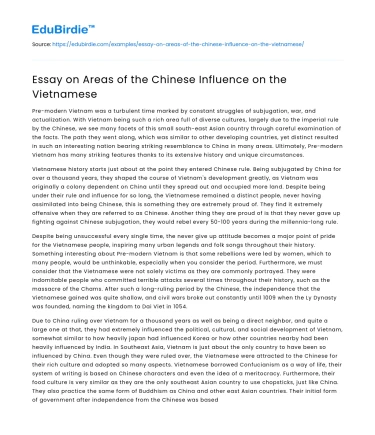Pre-modern Vietnam was a turbulent time marked by constant struggles of subjugation, war, and actualization. With Vietnam being such a rich area full of diverse cultures, largely due to the imperial rule by the Chinese, we see many facets of this small south-east Asian country through careful examination of the facts. The path they went along, which was similar to other developing countries, yet distinct resulted in such an interesting nation bearing striking resemblance to China in many areas. Ultimately, Pre-modern Vietnam has many striking features thanks to its extensive history and unique circumstances.
Vietnamese history starts just about at the point they entered Chinese rule. Being subjugated by China for over a thousand years, they shaped the course of Vietnam's development greatly, as Vietnam was originally a colony dependent on China until they spread out and occupied more land. Despite being under their rule and influence for so long, the Vietnamese remained a distinct people, never having assimilated into being Chinese, this is something they are extremely proud of. They find it extremely offensive when they are referred to as Chinese. Another thing they are proud of is that they never gave up fighting against Chinese subjugation, they would rebel every 50-100 years during the millennia-long rule.
Save your time!
We can take care of your essay
- Proper editing and formatting
- Free revision, title page, and bibliography
- Flexible prices and money-back guarantee
Despite being unsuccessful every single time, the never give up attitude becomes a major point of pride for the Vietnamese people, inspiring many urban legends and folk songs throughout their history. Something interesting about Pre-modern Vietnam is that some rebellions were led by women, which to many people, would be unthinkable, especially when you consider the period. Furthermore, we must consider that the Vietnamese were not solely victims as they are commonly portrayed. They were indomitable people who committed terrible attacks several times throughout their history, such as the massacre of the Chams. After such a long-ruling period by the Chinese, the independence that the Vietnamese gained was quite shallow, and civil wars broke out constantly until 1009 when the Ly Dynasty was founded, naming the kingdom to Dai Viet in 1054.
Due to China ruling over Vietnam for a thousand years as well as being a direct neighbor, and quite a large one at that, they had extremely influenced the political, cultural, and social development of Vietnam, somewhat similar to how heavily japan had influenced Korea or how other countries nearby had been heavily influenced by India. In Southeast Asia, Vietnam is just about the only country to have been so influenced by China. Even though they were ruled over, the Vietnamese were attracted to the Chinese for their rich culture and adopted so many aspects. Vietnamese borrowed Confucianism as a way of life, their system of writing is based on Chinese characters and even the idea of a meritocracy. Furthermore, their food culture is very similar as they are the only southeast Asian country to use chopsticks, just like China. They also practice the same form of Buddhism as China and other east Asian countries. Their initial form of government after independence from the Chinese was based on the Chinese government. Interestingly enough, the Vietnamese people are quite loose with their religious ties and have no shame about attending religious events that don't coincide with their own.
Something Vietnam does that is quite different from western culture is that they truly reset the elderly, and have a lot of veneration for elders. For example, it is never acceptable for an elderly person to be struggling in public without assistance, someone should always rush to help them as soon as possible. In the United States, the elderly are usually thrown into homes and seen as a burden to their younger family.
However, In Vietnamese culture, the elderly are given a great deal of respect and are taken care of by their kids, even ancestors long gone are to be honored every once in a while. For example, nobody is allowed to eat until the grandparents have been served and started eating. Furthermore, Vietnam has a very patriarchal society, and women are typically made to do all household chores. Education is extremely important in Vietnamese families, as kids are conditioned to perform extremely well in school and parents work demeaning, laboring jobs to support this so that in the future their kids will be able to take care of them. Furthermore, much like in China, boys are preferred to girls in Vietnamese families, as they carry on the family name, so you know you and your ancestors will continue to be venerated.
Girls become part of the man's family, leaving their original behind. so parents are discouraged from raising them in this sense, because they will take care of a girl for almost two decades only for her to leave their family behind for another man's, leaving nobody to care for her in her old age, thus making girls a liability. The intricacies of Vietnamese families are very fascinating and founded within the ideas of Confucianism.
Vietnamese history provides us with insight into a very proud and well-founded nation. While the heavy influence from China is extremely apparent, Vietnam has continuously remained distinct from them creating its own unique culture. They still hold disdain towards the Chinese however. My favorite example was from our lecture where Professor Asselin told us of a Vietnamese man who had held a visceral hatred towards the Chinese his entire life, but it turned out that he was mostly Chinese himself after a DNA test and ended up in a two-month depression. To summarize the Vietnamese spirit, Ho Chi Minh once said, “It is better to sacrifice everything than to live in slavery. ”






 Stuck on your essay?
Stuck on your essay?

